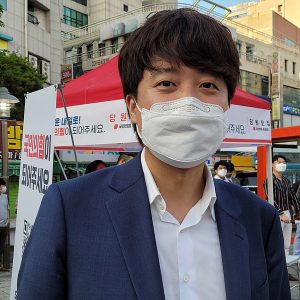Lee Jun-seok, the leader of the main opposition People Power Party (PPP), has a tall task in front of him: Not only will he try to lead his party’s candidate to win the presidential election next year, but he will do it while seeking to reform the party to garner support from young voters and those in the center.
After the PPP, the main conservative party in South Korea, won a landslide victory against the ruling Democratic Party in by-elections in April, the party underwent extreme makeover last month by choosing a 36-year-old who has never been elected to public office as party leader.
Lee Jun-seok, a Harvard graduate who started his political career in then-President Park Geun-hye’s inner-circle in 2011, is now leading the old-fashioned conservative party, which had failed to garner support in most elections after Park’s impeachment in 2017. He has never won in the general elections, being defeated three time in the constituency where he was born and raised, but he is now the first sitting party leader under 40 in South Korean history.
When Lee announced his bid for the party’s leadership in May, he was not at the top in the polls. Other candidates with experience working as floor leader in the party and a strong track record winning elections were the frontrunners, while he was consistently third or lower in the polls. However, after the party announced the final four candidates who had survived in the party’s cut-off, young lawmakers and those who have consistently demanded dramatic reforms of the PPP to remake it into a “competitive” conservative party started supporting Lee. That eventually created a powerful wave of support that was reflected in the election results – a shocking upset in a party where more than 70 percent of the members are in their 50s or older.
Since winning the PPP leader post, Lee has differentiated himself from his predecessors by hosting competitions to hire the party spokesperson and amassing policy suggestions from people directly. The PPP’s approval rating is about 3 to 7 percentage points ahead of the ruling Democratic Party’s in recent polls. However, none of his party’s official presidential candidates is among the top three in current polls – the top-ranked conservative, Yoon Seok-youl, is an independent, though he remains open to joining the PPP.
Lee’s debut as a party leader is going to be judged by his management of the presidential election campaign over the next seven months. Observers and experts say that the main reason for the tremendous support Lee received is a bet that the main opposition party can take the presidency back from the progressive Moon administration and ruling Democratic Party with a young party leader – a clear sign that the PPP is different.
Shin Yul, a professor of political science at Myongji University in South Korea, told The Diplomat that the image of the party leader is particularly important during the presidential election, and other candidates’ images were not as attractive as Lee’s.
“Conservatives made a ‘strategic choice’ to support Lee, and they usually made such a strategic move when it was necessary,” Shin said.
Local news outlets compared Lee’s victory with the wave of young European leaders who are governing their administrations over the past decade. However, Shin said that the odds are stacked against “the next Lee,” given the political system and structure in South Korea.
“I don’t think such winning by young politicians will continue to occur in South Korea. Since the leaders of European countries started their political activities in their teens, there should be a system to train young politicians, but our country does not have one,” Shin said.
While conservatives chose a young leader to garner more support from young voters and those in the center, some say that it is inevitable for Lee to face obstacles not only from progressives, but also from his supporters and his party’s lawmakers.
“Since he has no experience in parliamentary activities as a lawmaker, he could face a lot of challenges and resistance from the party,” Lee Jun-han, a professor of political science and international studies at Incheon National University in South Korea, told The Diplomat. “His predecessor, who had abundant political experience, was also badly checked by PPP lawmakers [and forced to] to step down ahead of by-elections in April.”
Based on the results of the presidential election next March, Lee’s destiny as a politician will be sealed. If his party takes the presidency back, he may become one of the frontrunners for the next presidential election in 2027. If the PPP loses, he may have no choice but to resign before the end of his term.
“If he fails to manage the public opinion and party members during the presidential race or campaign, he will be asked to resign,” Professor Lee said.
































